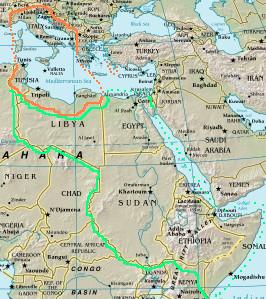
Imperialism, colonialism and irredentism played an important role in the foreign policy of Fascist Italy. Among the regime's goals were the acquisition of territory considered historically Italian in France (e.g. Nice) and Yugoslavia (e.g. Dalmatia), the expansion of Italy's sphere of influence into the Balkans (e.g. Greece) and the acquisition of more colonies in Africa. The pacification of Libya (1923–32), the invasion of Ethiopia (1935–36), the invasion of Albania (1939), the invasion of France (1940), the invasion of Greece (1940–41) and the invasion of Yugoslavia (1941) were all undertaken in part to add to Italy's national space. According to historian Patrick Bernhard, Fascist Italian imperialism under Benito Mussolini, particularly in Africa, served as a model for the much more famous expansionism of Nazi Germany in Eastern Europe.[1][2][3]
- ^ Bernhard, Patrick (11 October 2013). "Borrowing from Mussolini: Nazi Germany's Colonial Aspirations in the Shadow of Italian Expansionism". The Journal of Imperial and Commonwealth History. 41 (4): 617–643. doi:10.1080/03086534.2013.836358. S2CID 159508872.
- ^ Bernhard, Patrick (31 March 2015). "Hitler's Africa in the East: Italian Colonialism as a Model for German Planning in Eastern Europe". Journal of Contemporary History. 51 (1): 61–90. doi:10.1177/0022009414561825. S2CID 159506682.
- ^ Bernhard, Patrick (8 June 2017). "Colonial crossovers: Nazi Germany and its entanglements with other empires". Journal of Global History. 12 (2): 206–227. doi:10.1017/S1740022817000055. hdl:10852/61109.